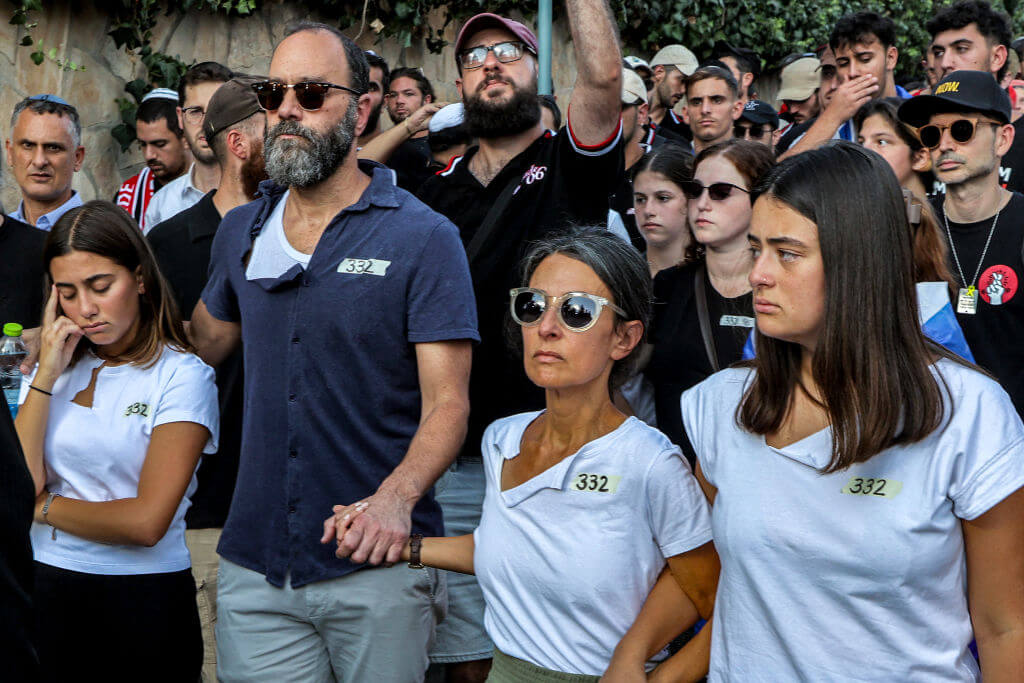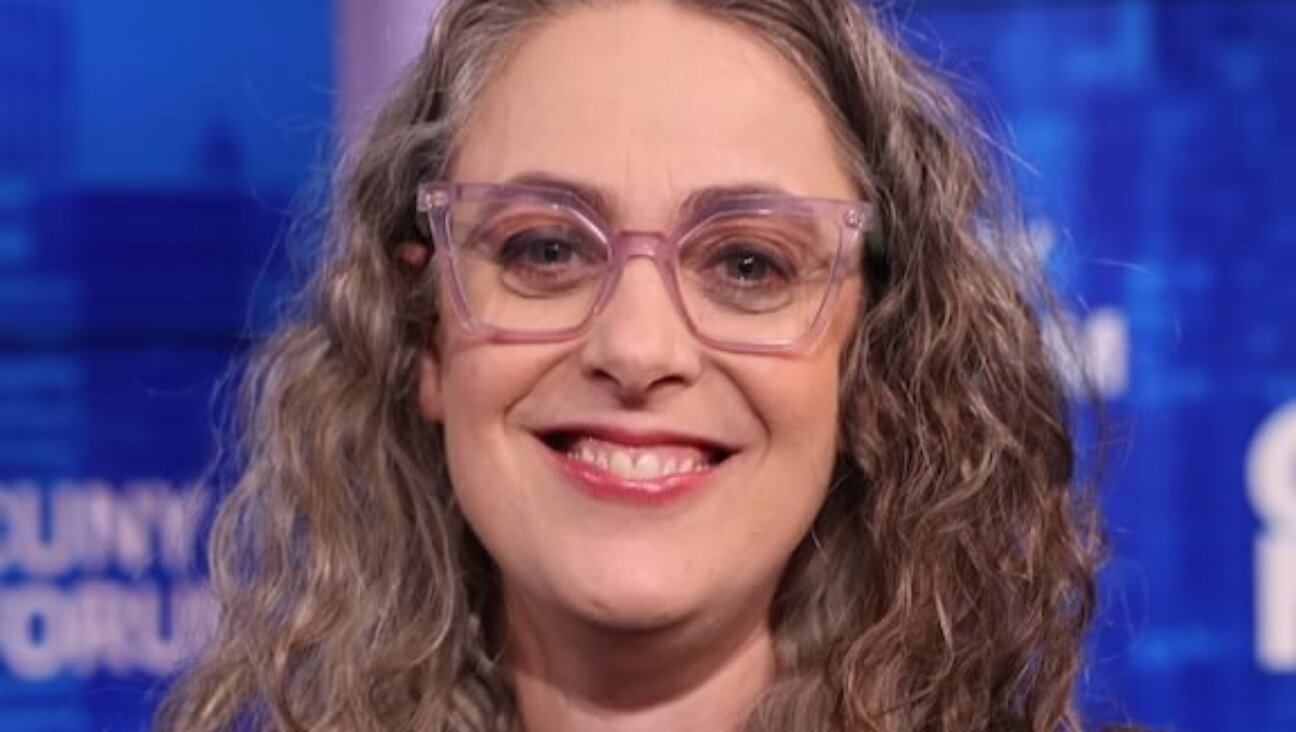The costs of this war are too high
How many more Jewish mothers do we have to watch share their anguish and pain with the world?

Jonathan Polin and Rachel Goldberg-Polin, parents of killed American-Israeli hostage Hersh Goldberg-Polin, and their two daughters at the funeral in Jerusalem on September 2. Photo by Gil Cohen-Magen/Pool/AFP via Getty Images
From the first weeks after Oct. 7, as Rachel Goldberg-Polin emerged as the face and conscience of the families of those killed and abducted that awful day, she reminded me of another American-Israeli mother with a similar first name: Rachelle Fraenkel.
Fraenkel, known as Racheli, had also been thrust onto the world stage by an unspeakable act of terrorism. Her son Naftali was one of three teenaged yeshiva boys kidnapped from a bus stop in the occupied West Bank and then killed, setting off Israel’s 2014 war against Hamas in Gaza. Fraenkel, like Goldberg-Polin a decade later, also met with presidents and prime ministers, also spoke powerfully at the United Nations Human Rights Council in Geneva. She recited the Mourner’s Kaddish at her son’s very public funeral, a rarity for an Orthodox woman in Israel, and Israel’s chief rabbi responded with “Amen.”
When I interviewed Goldberg-Polin at her home in Jerusalem in December, I asked if she had been in touch with Fraenkel. “I don’t want to go there,” she told me, saying it was “mean” of me to even ask. “Hersh is alive.”
That was then. On Monday afternoon, Goldberg-Polin buried her precious Hersh on a hilltop in Jerusalem, where Israeli President Isaac Herzog offered a deep apology, to the family and the country, for the failures that led to Oct. 7 and for not bringing Hersh and the hostages murdered alongside him home alive. Rachel and her daughters, Libby and Orly, murmured the first kaddish as Hersh’s father, Jon, recited it into the microphone, following Jewish custom to take three steps backward for the prayer’s closing line: May the one who creates peace on high bring peace to us and all Israel.
Amen. How many more times will we say it? How many more Jewish mothers do we have to watch share their anguish and pain with the world?
It is long past time for this terrible war to end, and as President Joe Biden acknowledged on Monday, Prime Minister Benjamin Netanyahu is not trying hard enough to end it. Not even close.
As I cried along with the Goldberg-Polins on Monday, my heart also ached for the thousands of mourning mothers and slain sons in Gaza whose names and faces and stories I do not know.
Their situation is not the same; I know well the difference between terror and war, between hostage-taking that leads to murder and collateral damage from airstrikes on legitimate targets. I know, too, that some of the thousands of Palestinians under 18 killed in these 11 months of war were militants, but many — too many — were civilians, innocent victims of a war they do not want, not so different from Hersh and Naftali.
When I wrote about Racheli Fraenkel a decade ago while I was Jerusalem bureau chief of The New York Times, many Jewish readers were offended that I paired her story with that of Aida Abdel Aziz Dudeen, whose 15-year-old son, Mohammed, was killed by Israeli forces as he protested the crackdown that followed the kidnapping of Naftali and his friends.
“Ms. Fraenkel and Ms. Dudeen share little aside from deep religiosity and empty beds where their sons should be,” I wrote then. “But both have been thrust into conspicuous roles in their side-by-side societies, reflecting the conflict’s human costs.”
Now, of course, Rachel Goldberg-Polin joins their not-exclusive-enough club of mothers who have lost sons in this endless, hopeless conflict. She spoke movingly on Monday, as she has throughout the last 11 months — as Racheli Fraenkel did a decade ago — sharing “the sickening feeling that we all could not save them.”
“You, each and every single one of you, did each and every thing right to survive 329 days in what I’m sure can only be described as hell,” she said, addressing Hersh and the five other hostages found slain alongside him in a tunnel under the southern Gaza city of Rafah. “I pray that your death will be a turning point in this horrible situation we are in.”
Last week I listened to an episode of The Daily podcast titled “The War That Won’t End.” The host, Sabrina Tavernise, opened the conversation with the current Jerusalem bureau chief of The Times, Patrick Kingsley, by talking about how “most wars normally end, which is that one side admits it can no longer win.”
Kingsley then attributed the Israel-Hamas stalemate largely to the fact that Israel had set an extremely high, if not impossible, bar for victory this time around — complete destruction of Hamas — while Hamas has a very low one: retaining a foothold in Gaza.
This is true, and smart. But I found myself questioning Tavernise’s framing. Historically, it seems to me, wars often end when the costs of fighting become too high for one or both sides.
It’s been clear for months, and as far back as 2014, that no cost is too high for the barbaric leaders of Hamas. No number of Palestinian lives lost, no amount of displacement and destruction, disease and hunger in Gaza, no international sanction.
Hamas is a terror organization. Israel is supposed to be a democracy. Its citizens’ resilience is part of its strength, but its leaders fail when they do not understand that resilience has limits. Or should.
Listen to Rachel, to Racheli; they and too many other mothers have paid the ultimate price, the violent deaths of their children. It’s too high a cost for them, for Israel and for all of us.

















